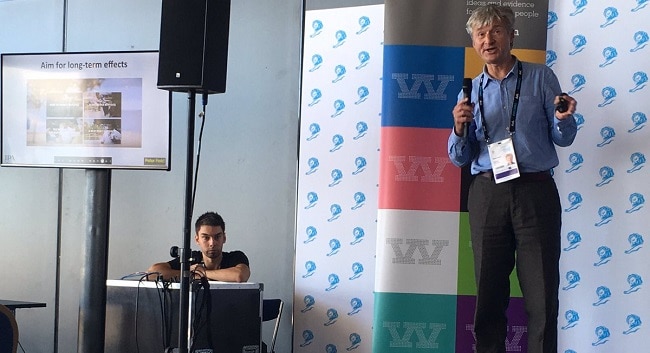#CannesYouFeelIt – Peter Field On How Short-Termism Is Killing The Benefits Of Digital
Today at Cannes, renowned marketing consultant Peter Field called for an end to ‘short-termism’ and warned of its detrimental impact on the ad industry, and creativity.
Field presented new research based on data from the IPA and Gunn proving that the rise of digital has driven a short term approach to marketing campaigns, which is massively impacting business metrics.
He argued that the marketing industry has been seduced by short-term thinking, with campaigns now running for less than a period of 6 months, and short term campaigns making up 45% of award submissions.
He went on to say that creative award judges were transfixed by digital comms and instant metrics, and that ‘short-termism has killed the benefits of the digital revolution’.
Field argued that these fleeting campaigns, while driving sales in the short term, do not drive market share or profitability, and ultimately have a 1/3rd of the impact than long term campaigns do.
During his presentation called ‘Selling Creativity Short: Why Short-Termism Is Undermining Creative Effectiveness’, he then talked about the need for an emphasis on creativity, arguing ‘instead of big data we need to be looking at long data’, i.e watching how creative campaigns perform over a long period of time.

Peter Field explains the impact of the global financial crisis on creative advertising.
Using research around the IPA Effectiveness Awards, he revealed that creative campaigns are more than twice likely to drive buzz and awareness as non-awarded campaigns, and over the past 20 years, 1 in 5 campaigns submitted for IPA Effectiveness Awards also picked up creativity awards.
Field used the example of John Lewis’ ‘Monty the Penguin’ campaign, which picked up the Grand Prix Effectiveness award this week, and said that the three key factors of its success were:
1. A major commitment to TV spend, coupled with a smart online strategy for broad reach;
2. £4-5 million budget ensuring longevity, as although the short term objective is to drive Christmas sales, the campaign has to see the brand throughout the entire year;
3. A clear link to social good.
Field wrapped up by stating that the ROI for the John Lewis campaign was well over 8:1, and its market share has grown tangibly.
Field’s final point was the most sobering, as he reminded the room of the powerfully detrimental effect that the global financial crisis had on the advertising industry. He argued that real budgets have been dramatically cut since the global recession in 2008, and that clients now see creativity as a substitute for budget rather than a multiplier.
He went on to describe how campaign efficiency across the board has fallen, with creative campaigns now 50% as efficient as they were pre-crisis.
Ultimately, Field called for the industry to ‘build long-termism into our thinking, and make a business case to execs for long term campaigns.’
